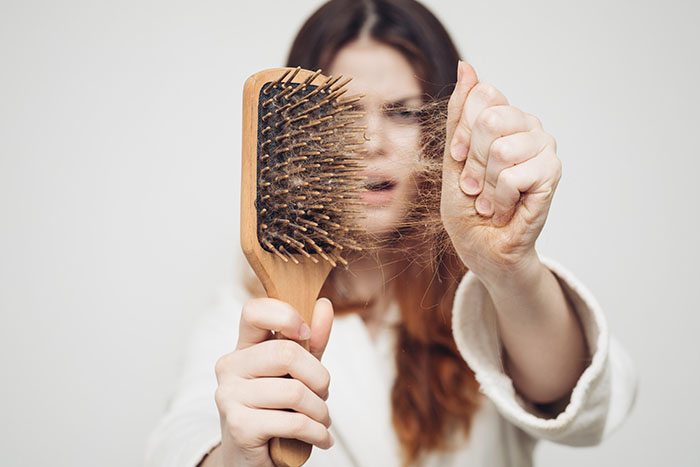Table Of Content

This article looks at what happens when hair falls out excessively, why this can occur, and where to seek treatment. Yes, hair tends to regrow when you are no longer exposed to the poison. Prioritize self-care and set aside time once a week to deeply nourish your hair and scalp with the Beach Goddess Hot Oil Hair Mask. It’s important to get the right vitamins and minerals. But you don’t want to overdo it, especially with supplements.
Skin Cancer Overview
When a man has hereditary hair loss, the first sign is often a receding hairline or bald spot at the top of his head. This usually isn't noticeable because new hair is growing in at the same time. Hair loss occurs when new hair doesn't replace the hair that has fallen out.
And 5 ways to save your strands
The Pain of Losing My Hair During Chemotherapy - The Atlantic
The Pain of Losing My Hair During Chemotherapy.
Posted: Sat, 20 Jan 2024 08:00:00 GMT [source]
Hair tends to regrow on its own when the rubbing stops. Some people pull on their hair, often to relieve stress. If you want to diminish a noticeable scar, know these 10 things before having laser treatment. AARP is a nonprofit, nonpartisan organization that empowers people to choose how they live as they age. For many people, their hair is an important part of who they are. Most of us shed hair a little at a time — pretty much all the time.
cancer and cancer treatments

As men age, they experience changes in their androgen hormone levels. Over time, these hormones cause the hair follicles to shrink, resulting in shorter and finer strands of hair. Men who have fathers or close relatives with male pattern baldness are at highest risk for developing baldness. The type and severity of hair loss you experience may determine the outcome (prognosis). Some types of hair loss are permanent, especially if you have damage to your hair follicles.
Conversely, this hormone change may also cause excessive hair growth on the face and chest. People with PCOS hair loss typically take the oral medication spironolactone to help regrowth. Hormonal birth control may also be prescribed to help lower testosterone levels causing hair loss. Like men, as women age, they experience changes in their androgen levels. Androgens are sex hormones that contribute to growth and reproduction. Over time, these hormones cause hair follicles to shrink, resulting in shorter and finer strands of hair.
But if your follicles become damaged, the hair loss may be permanent. See your dermatologist if you notice this type of hair loss. The sooner you start treatment, the better the chances for hair regrowth. When you’re under a lot of pressure, your follicles might go into a resting phase. Severe stress may also trigger an autoimmune condition, like alopecia areata. If you have a mental disorder called trichotillomania, you might pull your own body hair out as a response to stress.
What is the prognosis (outlook) for people with hair loss?
Alopecia areata hair loss can affect parts of the body, the head, or both. A healthy balanced diet is also important in stress reduction too as it can support a healthy immune system, repair damaged cells and even reduce elevated cortisol levels. Some studies suggest that telogen effluvium can also be connected to low levels of iron, so include iron-rich foods like leafy vegetables, lentils and liver where you can.
The Hair Growth Cycle
Telogen effluvium is a condition in which the hair remains in the telogen phase of the cycle. This causes more hair than usual to fall out, sometimes in handfuls. Always talk to a healthcare provider before discontinuing any medication. Having excessive hair fall out, or shed, can be upsetting and stressful. However, it is common, and in most cases, it is also temporary. Most people lose anywhere from 50 to 100 strands of hair each day, according to the American Academy of Dermatology.
How does female hair loss differ from male hair loss?
There are several causes of hair loss in women, including medical conditions, certain medications, and physical or emotional stress. Here are five categories of hair loss affecting 50-plus women. People with normal hair growth usually lose 50 to 100 hairs a day.
Those who began the trial with more pronounced hair loss saw the most benefit from the medication. But some factors may make a woman more likely to experience hair loss. Menopause can also lead to uncomfortable systemic symptoms such as night sweats, weight gain, and vaginal dryness, which may raise your overall stress levels. Alopecia means “hair loss.” There are many different types of alopecia, in addition to androgenetic alopecia. Treatment options for hair loss typically depend on the cause.
Oftentimes, identifying the reason for your hair loss is key to treating the problem. Talk to a doctor if your hair loss comes with fatigue, muscle weakness, weight loss or gain, or dry skin. Your hair should grow back with treatment, but it may take several months. Your doctor might be able to switch your medicine if this happens to you.
TE is typically reversible and often resolves 6–8 months after your body readjusts or the trigger is gone. You can sometimes identify TE by looking at the strand. Some research connects excess intake of vitamin A or selenium with an increased risks for hair loss. If they suspect an autoimmune or skin condition, they might take a biopsy of the skin on your scalp.

No comments:
Post a Comment